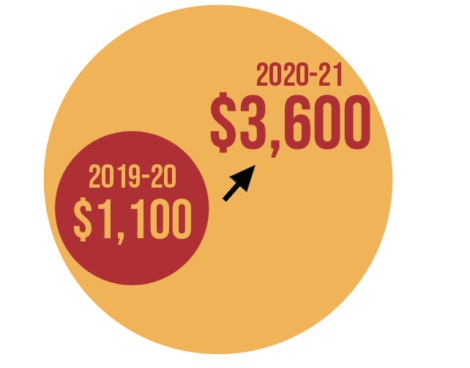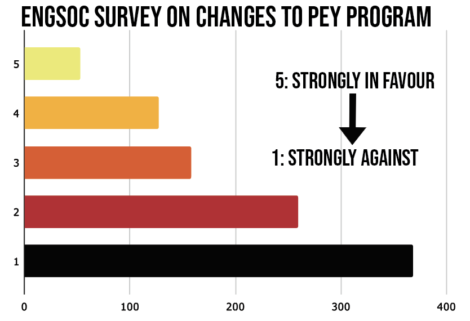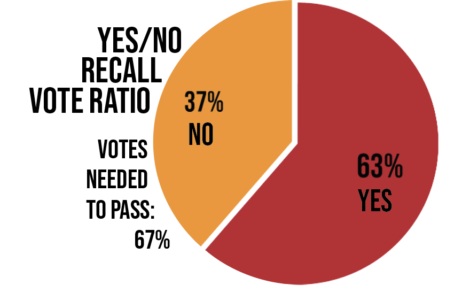The Faculty of Applied Science & Engineering (FASE) has instituted many changes to its Professional Experience Year (PEY) program that have drawn criticism from many students for increasing the cost from $1,100 to $3,600 and not reflecting what students wanted to see. The changes to the program were passed at the Faculty Council meeting on October 23 and apply to students entering the faculty starting in fall 2020.
Students voiced concerns at the annual accountability meeting that their elected representatives of the Engineering Society (EngSoc) did not do enough to oppose the revamp. The EngSoc president was nearly voted out of office at the meeting.
The PEY program allows students to take a 12- or 16-month work placement while on leave from school. Many students participate in the program as a way to fulfill their required hours of engineering experience needed to graduate.
The FASE has been working to revamp the program since 2016. Students have also criticized the existing program for several years — an EngSoc report in 2017 revealed concerns directed toward the faculty’s career advising centre, the Engineering Career Centre (ECC). The ECC runs the PEY program, has a job board, and offers information sessions to help students get placements. Students felt that the ECC workshops were outdated, and 71 per cent were unhappy with the fees that they were paying to the ECC.
The report had also laid out the main changes students wanted: more flexibility in length of placements, more accountability and oversight of the ECC, and more ECC staff members that are engineers or have engineering experience.
Backlash toward the fee increase
Previously, students who wanted to register for the PEY program had to pay $125 to register and paid the remaining $975 after they accepted an offer, for a total of $1,100. Under the new plan, students have to pay $450 each semester of their second and third years, and two installments of $900 each after they accept their offer, for a total of $3,600. The installments paid in second and third year do not guarantee a PEY placement.

The higher fee “poses a huge accessibility barrier for low-income students and unfairly penalizes students who do not find work terms,” wrote engineering science student Armin Ale to The Varsity. Now, if students do not find work placements, they still have to pay the $1,800 to register for the program. This represents an approximate 1,300 per cent increase in the fees paid before a student finds and accepts their offer.
Much of students’ concerns about the increased price stem from their discontent with the ECC. However, students expressed that the services and advice of the ECC are not always of good quality and have, in some cases, even hindered students; many students seek help from the student-run You’re Next Career Network (YNCN) instead. Students fear that simply paying more for the ECC’s services will not automatically improve their value.
Mechanical engineering student Savo Bajic thinks that, even separately from the total amount of fees, the fee distribution should be that students pay a majority of the fees after they accept a placement. Shifting the fee structure to have most fees paid after a student accepts their offer gives students more flexibility to decide later on in the process if they end up choosing not to do a PEY, and costs them less money if they are unable to find a placement.
In addition, students argue that having the ECC charge most of its fees after an offer is extended would demonstrate confidence that it can help most students find placements successfully.
Upper-year mechanical engineering student Sourabh Das wrote, “There are existing problems with the quality and quantity of services which make it difficult to see any sort of massive expansion by the faculty in good faith.” He added that he would like to see more flexibility in work terms, meaning that students could take multiple shorter placements rather than being confined to 12–16 month ones.
Roger Francis, Executive Director of the ECC, wrote to The Varsity that multiple student groups were consulted in the changes, including EngSoc and YNCN, and that “the costs are directly related to delivering the various aspects of an official co-operative education program.”
He added, “An assessment and design process was initiated to create a co-op program that was in keeping with student demands and satisfied all requirements of an accredited Co-operative Education.”
Under the new plan, the ECC hopes to hire more staff members, institute new professional development and career programming, and provide more support for students during their work placements. “As the program continues to develop and evolve, feedback is continuously being integrated into the future program,” wrote Francis.
Some students also expressed concerns about the attitude of certain faculty administrators toward student criticism of the revamp. One student, Muskan Sethi, and two others, who wished to remain unnamed due to involvement in faculty governance, attended a meeting in February where they recalled a conversation about the PEY changes.
According to the three students, Vice-Dean Undergraduate Thomas Coyle made insensitive remarks about low-income students and dismissed students’ concerns about the increased cost by comparing it to the increase in the price of his Netflix subscription. Coyle is also a proponent of the final report on the revamp.
Coyle wrote to The Varsity that he was “pointing out that there is a cost for the provision of any service, and it is natural to want that cost to be as low as possible.” However, he noted that he has apologized for “what could reasonably have been interpreted as minimizing concerns over the fee.” He also wrote that he did not intend to make students feel that their concerns were not valid, and wrote that he has worked to address affordability concerns with the new program.
Engineering Society nearly recalls president
At the annual EngSoc recall meeting, where all undergraduate engineering students have the ability to recall the EngSoc executives — thereby removing them from office — each executive member gave a presentation on their work so far this year and answered questions from students. Over 250 students attended the meeting on October 30, which ran from 6:00 pm to after midnight.
Before the reports from executive members, EngSoc Speaker Zahir Firoze and Ombudsperson Saskia van Beers presented the results of a survey they conducted to see how students felt about the new PEY program. Out of 965 students who responded to a question on whether they supported the revamp, 627 were against the changes, 158 were neutral, and 180 supported it.

Thirty-five per cent of students also reported that they would not be able to access the program with the new changes without financial support.
The first item on the agenda was the investigation into President Christopher Kousinioris. Firoze and van Beers said that they received complaints that Kousinioris “misrepresented the student body” at the Faculty Council meeting where the PEY changes were approved. The complaints alleged that Kousinioris made it seem like students supported the revamp when they did not. Firoze and van Beers then launched an investigation about the complaints.
After interviewing several people who were at the meeting, the investigation found no clear answer as to whether Kousinioris said that students were in favour of the changes. According to the report, Kousinioris expressed that when he realized the program would pass anyway, he showed personal support for it at the Faculty Council meeting to maintain good relations with the FASE.
Kousinioris told students at the accountability meeting that although he may have said that he personally supports the changes, he did not intend to say that all students supported the changes, calling his remarks “a poor choice of words.” He claimed that he has fought hard in the past for the changes to the program that students wanted to see, although he acknowledged that more consultation with students should have been done.
In his speech to the student body detailing his work this year, delivered after the complaints, Kousinioris laid out a plan of action to enact the changes students wanted to see to the program. He intends to talk to faculty administration about their demands and, if all else fails, organize a boycott of the ECC.
In their questions to him, students were overall concerned that Kousinioris did not do enough to stop the changes, nor did he keep the student body adequately informed on what was happening with the new program.
Following a lengthy question and discussion period, the vote to recall Kousinioris narrowly failed, with 252 votes in favour, 145 against, and 29 abstentions. Not counting abstentions, 63 per cent voted in favour of recalling the executive — slightly less than the two-thirds majority required to implement the recall.

After the accountability meeting, Kousinioris wrote to The Varsity, “We continue to be fully dedicated to getting a better deal for students. We will be launching into more advocacy and consultations soon.”
Editor’s note (November 2): This article has been updated to include comment from Coyle.


